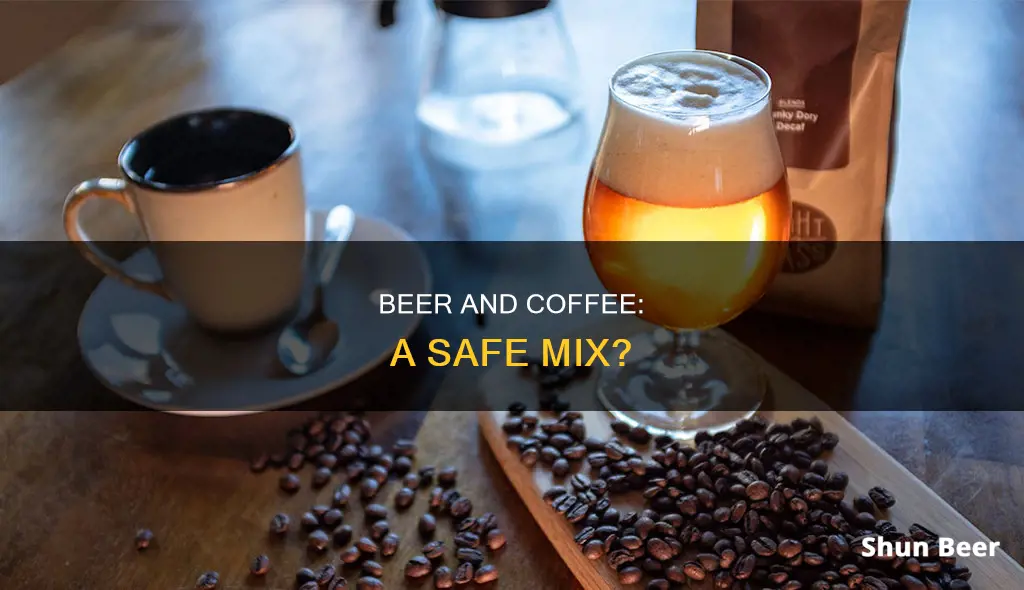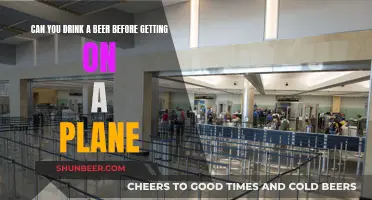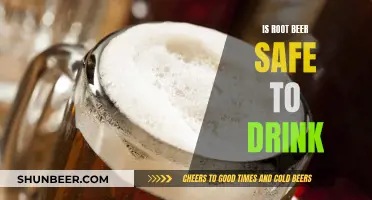
Drinking coffee after beer is generally not recommended. While it may seem like a good idea to mix a stimulant and a depressant, the caffeine in coffee can mask the effects of alcohol, making you feel more alert and capable than you are. This can lead to drinking more alcohol than intended and increase the risk of alcohol-related incidents such as drunk driving, injury, and alcohol poisoning. Additionally, mixing the two can affect your heart and sleep patterns, and cause dehydration.
What You'll Learn

Coffee after beer may not sober you up
Caffeine and alcohol have opposing effects on the body. Caffeine is a stimulant that increases activity in your brain, making you feel more alert and energetic. On the other hand, alcohol is a depressant that slows down brain activity, causing loss of motor control and lack of concentration. When mixed, these two substances can counteract each other and lead to problematic side effects.
One of the main risks of drinking coffee after beer is that caffeine can mask the effects of alcohol, making you feel less drunk than you actually are. This can lead to drinking more alcohol than usual, increasing the risk of alcohol poisoning, accidents, injuries, and alcohol-induced injuries. Drinking coffee after beer can also disrupt your sleep pattern and affect your heart, increasing your blood pressure and the risk of other cardiovascular conditions such as heart disease, heart attack, irregular heartbeat, or stroke.
Overall, it is best to avoid mixing caffeine and alcohol. If you do choose to combine the two, it is important to consume them in moderation and be aware of both the alcohol and caffeine content.
Beer and Paracetamol: Safe Mix or Not?
You may want to see also

It can lead to binge drinking
Mixing caffeine and alcohol is a dangerous combination that can lead to binge drinking. While caffeine is a stimulant that can make you feel more alert and energetic, alcohol is a depressant that causes drowsiness and loss of motor control. When combined, these two substances can counteract each other, leading to a false sense of sobriety.
The stimulant effects of caffeine can mask the depressant effects of alcohol, making individuals feel more alert and capable than they actually are. This can lead to the consumption of more alcohol than intended, as people may not feel the full effects of intoxication. Caffeinated alcoholic beverages, such as Four Loko and Joose, have been found to have higher alcohol content than beer, further contributing to the risk of binge drinking.
Binge drinking is defined as consuming about four to six drinks in a two-hour period. Studies have shown that individuals who mix alcohol with high-caffeine energy drinks have a four times higher chance of binge drinking. Additionally, the increased alertness and energy from caffeine can lead to feelings of being capable of drinking more, further contributing to binge drinking behaviour.
The masking effect of caffeine on alcohol's depressant effects can have serious consequences. Individuals may drink more than they normally would, increasing the risk of alcohol poisoning, driving while intoxicated, and injuries. Furthermore, the combination of caffeine and alcohol can lead to risky behaviours and alcohol-related incidents, such as riding with a drunk driver or becoming injured or sick.
In conclusion, mixing caffeine and alcohol can lead to binge drinking due to the stimulant effects of caffeine masking the depressant effects of alcohol. This can result in dangerous consequences, including alcohol poisoning and increased risk of injury. It is important to be aware of the potential risks associated with combining these two substances and to consume them with caution.
Alcohol-free beer: A safe drink for liver disease patients?
You may want to see also

It can cause an irregular heartbeat
Drinking coffee after beer can cause an irregular heartbeat. This is because caffeine and alcohol have opposite effects on the body. Alcohol is a depressant, slowing down brain activity and causing loss of motor control and lack of concentration. On the other hand, caffeine is a stimulant, increasing brain activity and making you feel more alert and energetic. When combined, these two substances can counteract each other and cause irregular heartbeats, especially in people who already have a history of heart problems.
The combination of caffeine and alcohol can also increase your blood pressure, which can lead to a higher risk of heart disease, heart attack, or stroke. People who have existing cardiovascular issues, such as an irregular heartbeat, should be particularly cautious and avoid consuming large amounts of alcohol and caffeine together.
In addition to the direct impact on the heart, the mix of caffeine and alcohol can also affect your sleep patterns. Caffeine blocks sleep-inducing receptors in the brain and interferes with the body's circadian rhythm, leading to disruptions in your sleep. An irregular sleep schedule can further contribute to heart conditions.
The masking effect of caffeine on alcohol's depressant effects can also lead to binge drinking, increasing the risk of alcohol poisoning and other alcohol-related injuries or accidents. Therefore, it is generally recommended to avoid mixing caffeine and alcohol or consuming them close together, as the potential side effects can be harmful.
Enjoying Beer While Watching Champions League Games
You may want to see also

It can lead to heightened anxiety
Mixing caffeine and alcohol is generally not recommended. While it might make you feel more alert, it can also lead to heightened anxiety.
Caffeine and alcohol have opposite effects on the body. Caffeine is a stimulant that increases activity in your brain, making you feel more alert and energetic. On the other hand, alcohol is a depressant that slows down brain activity, causing loss of motor control, lack of concentration, and drowsiness. When combined, these two substances can counteract each other, leading to problematic side effects.
One of the key issues with mixing caffeine and alcohol is that caffeine can mask the effects of alcohol. This means you may feel less drunk than you actually are, increasing the risk of drinking more than usual. As a result, you may experience negative consequences such as alcohol-induced injuries, accidents, or poisoning.
In addition, both alcohol and caffeine can raise your blood pressure, which can lead to an increased risk of stroke, heart attacks, and irregular heartbeats. People who are sensitive to stimulants or have existing cardiovascular issues should be especially cautious about mixing these substances.
The combination of caffeine and alcohol can also disrupt your sleep patterns. Caffeine blocks sleep-inducing receptors in the brain and interferes with your body's circadian rhythm, making it difficult to fall asleep and affecting the quality of your sleep. This can have short-term and long-term impacts on your overall health and well-being.
While the occasional Irish coffee or rum and Coke may not cause significant harm, it is important to consume these drinks in moderation and be aware of both the alcohol and caffeine content. It is also recommended to avoid consuming caffeine before or after drinking alcohol, as caffeine can stay in your system for several hours and continue to influence the effects of alcohol.
Beer and Meclizine: Is It Safe to Drink Alcohol?
You may want to see also

It can cause dehydration
Mixing alcohol and caffeine is generally not recommended. While it might make you feel more alert, it can also cause dehydration. Both alcohol and caffeine are diuretics, which means they make you urinate more often. If you don't drink water while consuming them, you can become dehydrated. Dehydration can lead to dizziness, lightheadedness, dry mouth, thirst, and in more severe cases, poor kidney function, muscle cramping, confusion, and shrunken blood vessels in the brain.
Drinking coffee when you have a hangover might make you feel more alert, but it can also make your hangover symptoms worse or last longer due to its dehydrating effects. It is important to note that caffeine does not reduce your blood alcohol level or help you sober up. Instead, it can mask the effects of alcohol, making you feel more alert and capable than you actually are. This can lead to drinking more alcohol than intended and increase the risk of alcohol poisoning, which requires immediate medical attention.
Consuming caffeine and alcohol together can also affect your heart and sleep patterns. It raises your blood pressure and increases the risk of heart-related issues such as heart disease, heart attacks, and irregular heartbeats. Additionally, caffeine blocks sleep-inducing receptors in your brain, disrupting your sleep and potentially leading to fatigue and cognitive issues.
While an occasional Irish coffee or rum and Coke might not cause significant harm, it is important to consume these drinks in moderation and be aware of both the alcohol and caffeine content.
Beer Distributors: The Logistics of Getting Beer to Customers
You may want to see also
Frequently asked questions
Drinking coffee after beer is generally not recommended due to the potential health risks associated with mixing caffeine and alcohol.
Mixing caffeine and alcohol can increase the risk of heavy drinking, alcohol dependence, physical harm, and other negative consequences. Caffeine can mask the effects of alcohol, making you feel more alert and capable than you actually are, which can lead to drinking more alcohol than intended.
Caffeine can increase your heart rate, excitability, anxiety, and sleeplessness. It can also mask the sedative effects of alcohol, leading to a false sense of sobriety and potentially resulting in alcohol poisoning.
It is recommended to avoid mixing caffeine and alcohol altogether. If you want to drink coffee, it is best to consume it at a different time than when you are drinking beer or alcoholic beverages.







